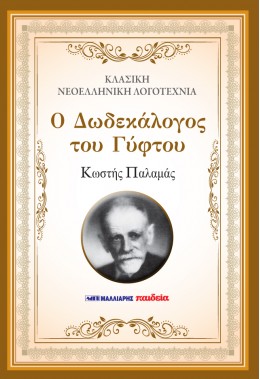Ο ΔΩΔΕΚΑΛΟΓΟΣ ΤΟΥ ΓΥΦΤΟΥ / THE TWELVE WORDS OF THE GYPSY
 “>
“>
Autor:
KOSTIS PALAMAS
Country:
Greece (GR)
Book Theme:
European writers “without borders”
Publisher:
MALLIARIS PAIDEIA
Publishing Year:
2021
Kostis Palamas was a central figure in modern Greek literature and a leading proponent of the Demotic Greek language movement. Born in Patras, he lost both parents at a young age and moved to Mesolongi, where he began writing poetry. He studied law at the University of Athens but soon devoted himself entirely to literature. His extensive body of work includes poetry, essays, and plays. He was a central figure of the Greek literary generation of the 1880s and one of the cofounders of the so-called New Athenian School (or Palamian School). Among his notable works are “The Twelve Words of the Gypsy”, “The King’s Flute”, and the words to the Olympic Hymn. His contributions significantly influenced the national identity. Romain Rolland considered him the greatest poet in Europe.
National Award for Children’s and Young People’s
Abstract
“The Twelve Words of the Gypsy” by Kostis Palamas was first published in 1907 and it’ s a seminal work in modern Greek literature, encapsulating the essence of a nation’s soul through a poetic exploration of identity, freedom, and the human condition. This long poem, divided into twelve sections or “words,” represents a lyrical journey that intertwines the personal with the collective, the individual with the universal.
At the heart of the poem is the figure of the Gypsy, a wanderer who embodies the spirit of freedom and the search for truth. Through his voice, Palamas delves into the themes of displacement, existential longing, and the quest for a deeper understanding of life and one’s place in the world. The Gypsy’s words are both a personal monologue and a reflection of the broader human experience, resonating with themes of love, loss, hope, and despair.
Each of the twelve words addresses a different aspect of life and existence, offering profound insights into the nature of humanity. The Gypsy’s musings range from meditations on nature and the cosmos to the struggles of everyday life, capturing the beauty and tragedy of the human condition. Palamas’ language is rich and evocative, blending classical Greek influences with modernist sensibilities to create a tapestry of imagery and emotion that is both timeless and deeply rooted in the Greek cultural milieu.
“The Twelve Words of the Gypsy” is not merely a collection of poetic reflections; it is a philosophical exploration that challenges readers to contemplate the complexities of identity, the passage of time, and the search for meaning. Palamas’ masterful use of symbolism and metaphor invites readers to engage with the text on multiple levels, uncovering new layers of meaning with each reading.
This work stands as a testament to Palamas’ literary genius and his ability to capture the spirit of his time while speaking to universal themes that transcend cultural and temporal boundaries. “The Twelve Words of the Gypsy” remains a cornerstone of Greek literature, a poetic masterpiece that continues to inspire and provoke thought among readers worldwide. Through the Gypsy’s journey, Palamas invites us to reflect on our own paths, encouraging a deeper understanding of ourselves and the world around us.



